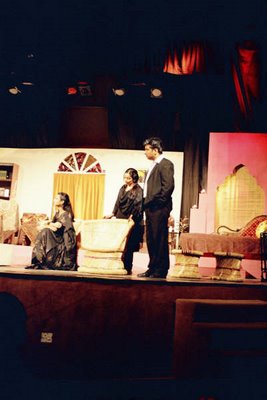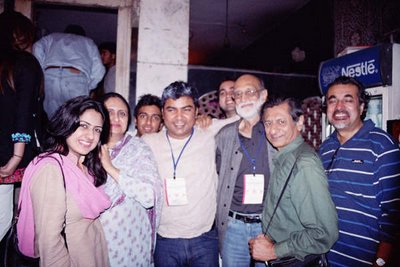I bet you’ve seen Rakesh Belal. He is ubiquitous. An 18-year-old dropout, the sort found in trackpants and a fake Nike t-shirt outside shantytown video parlours and ramshackle gyms anywhere across the country. But this is not how we found him. It was the summer of 1996, and we were setting off from New Delhi railway station, going to Ghazipur for Muharram. We were in our compartment, when we noticed a boy, scavenging for food. The innocence of his face captured Mom’s heart. She gave him something to eat, and Dad gestured at him to come inside. Once with us, he settled down as if he had always been part of the family. When the train moved, Mom and Dad found it hard to send him away. And soon Rakesh Belal was en route to Ghazipur too.
Belal was not his real name. He was Rakesh Singh from a village in Uttar Pradesh called Hauwwapura. He had no clue where it was, but knew that the nearest city was Agra. His father’s name he gave as “Jungli Singh” — which we later found out to be Jungani Singh — and his mother’s name was Shanti Devi. His father was dead and his mother had left home. He had lived once with an aunt, but she ill-treated him, pushing him to leave home. In Delhi, he found refuge at a constable’s home, but was mistreated there too. Having fled that place as well, he was caught later by the authorities and thrown into a correction facility — an abysmal institution, where the rooms were cramped, the food miserable and the older kids were vicious to the younger ones. Finally he escaped, and that’s when we found him on the platform.
Before Belal, we had once tried adopting a street kid whom we named Jalal. He ran away 11 months later, after a tiff with our servant. My parents were heartbroken. They looked for him everywhere, and tried filing a complaint at the local police station, but were told that they had no locus standi to report his going missing since they had never reported finding him in the first place. This time, we were better prepared. We had Belal photographed, and filed an FIR stating that we had found him and requesting that we be treated as his legal guardians until the police found his real ones. Of course, the FIR was a formality. The police never did anything.
With paperwork over, Belal’s initiation into our family began. Initially he was very conscious of his non-Muslim antecedents. He would resist our Muslim habits like eating non-vegetarian food, or mouthing Arabic phrases for pleasantries or for cursing. But he had little choice. The first debate arose on his name. Mom was too unhappy with “Rakesh.” After much deliberation we yoked an Arabic “Belal” to his Hindu “Rakesh” name. But this made me question our own socio-religious and racial politics. Why didn’t we name him Ali or Hasan? Why did we choose Belal for him? Belal was one of the revered associates of Prophet Mohammad but he was a black African who was rescued from slavery by the Prophet himself from a local tribesman Ummaiyah. Belal had an unusually melodious voice and Prophet appointed him as a Muezzin at the first Islamic mosque in Medina. Many resented Belal’s proximity to Prophet and one day some compatriots complained that there were too many pronunciation errors in Belal’s prayer call or Azaan. The Prophet heard them out, smiled and ordered someone else to give the prayer call next morning. But the legend goes that the next morning the sun just wouldn’t arise. Worried, people queued up at the mosque only to hear that Allah has decreed that the sun won’t come up till Belal gives the prayer call. But Belal remained an African slave. He was not the progeny. And we being the progeny couldn’t name an outsider with a progeny’s name.
Soon Belal overcame his inhibitions. He started enjoying non-vegetarian food, started participating in religious activities, and started showing comfort and familiarity with Muslim habits. Mom and Dad got him admitted to a local government school. It made me question our motives again. I recall when it was time for me to get admitted to a school, Mom left no stone unturned (to use a cliché) to get me admitted to an “English-speaking” school. It was unthinkable for her to compromise on her children’s education. However, the same urgency was not shown when it came to Belal’s education. They were happy admitting him to a Hindi-speaking government school. One evening I snuggled up to Mom and asked about this discrimination. I could see the discomfort in her eyes. She paused, composed herself, and with a motherly assurance said, “Son, this is the best we can afford for him as of now.” I made an uneasy peace with our charity.
Belal started growing in our household. He would call Mom, Mom and Dad, Dad. He would go to school like a regular kid, would love watching television, would eat what we ate, and went where we went. But he remained an outsider. He never got the same acceptance from our relatives. Sometimes it would bother him. He’d ask Mom as to why the extended family doesn’t treat him as one of them. Mom would cuddle him and say we treat you as son and that’s all that matters. That would assure him but the discomfort remained. His status remained quaint. He was not a servant but he was not family either. Days passed and he grew rapidly. Soon he was the tallest in his class. His interest in studies waned. He cleared his sixth grade exam but failed in the seventh grade. There was general disappointment at home but no sense of gloom as it would have been had any one of us would have failed. A repeat attempt next year again resulted in failure. By now he was completely off studies. He dropped out of school, made strange friends, remained away from home for long hours, and had generally no explanation for his absence, started stealing money from Dad, and became rude and indifferent in his behaviour. He started questioning our motives and often in his fits pointed out our discriminating bits. Our relationship plummeted. When confronted he’d maintain a dourly silence that exasperated us even more. Often it would result in me thrashing him. Later, I would regret it but I didn’t have the guts to go up to him and apologize to him. One day during one such session he lost his cool, caught me by gruff and pinned me against the wall. There was blood in his eyes. He could have killed me. It took three people to pull him off me. That day I realized he has grown up and cannot be subdued by physical violence.
Then one day we got a phone call from the local police station asking whether someone called Rakesh Belal lived with us. My father nervously admitted yes. The officer reported that he is in their custody. There is complaint against him for video piracy and stealing CDs from a shop where he worked at Lajpat Rai Market. We had seen this sudden surge of video and game CDs at home but had no clue as to where did he get them from. But I guess we didn’t care either. One day Mom did ask him and he muttered something about rejects from the shop where he worked. And that was it. Dad in a very obsequious manner apologized to the policeman, explained the circumstances in which the boy grew up, begged for clemency, and assured him that this would never be repeated. The result was that the policeman let go off him after a couple of slaps and kicks. But Belal was shaken. He came home as a frightened boy. Mom and Dad made best use of this opportunity to get him back into the fold. They made him pledge that he will shun his bad habits, reform himself, and will restart his studies. Belal applied at the National Open School for the tenth grade and started his second innings with us.
His interest in technology grew. He would fiddle around with the computer and play stations for long. Soon we found that he was running a play station repair shop in our mezzanine floor. Around this time he also got introduced to the Internet. He’d idle time searching for gaming software even pornography. One day my cousin told him about Google Earth and thus became his search for his roots. He’d search for Hauwwapura endlessly but would find nothing. Then one day during a Goggle search he typed Hauwwapura and chanced upon an entry that mentioned a town Karawali. Before we knew he was aboard a bus to Agra and then to Karawali. When he reached Karawali he couldn’t find anything resembling close to his memory. Disappointed he boarded back on the bus to Delhi. As the bus moved he turned towards his fellow passenger and asked him whether he knew a certain Mansingh (his uncle) in Hauwwapura. The fellow passenger said yes and led him straight to his ancestral house. On May 26, 2007 at 9 pm, eleven years after we found him on a railway platform, we get a call from a triumphant Rakesh Belal. His opening words were, “Mummy! I found my house. I am standing in front of it.” My Mom had a smile on her lips. My Dad tears.
Belal became a hero in his village. The news spread like wildfire and soon people from adjoining villages poured in to have a look at this wonder boy. Three days later he came back to Delhi with photographs and stories of his reunion. There was jubilation in our house. We all huddled around him willing to hear every word he had to say. He said the people in his village were awestruck that even Muslims can be human enough to bring up an orphan. I chuckled when I heard that. I don’t know how fair we’ve been to Rakesh Singh but he has grown up with us. His triumph is ours and we share his newfound happiness. He still stays with us and perhaps will forever. Rakesh Singh has got a compartment in his tenth grade exam but there is hope now.
Dan Husain
PS: An abridged version of this tale was published in Tehelka dated July 06, 2007.


